Archives
-
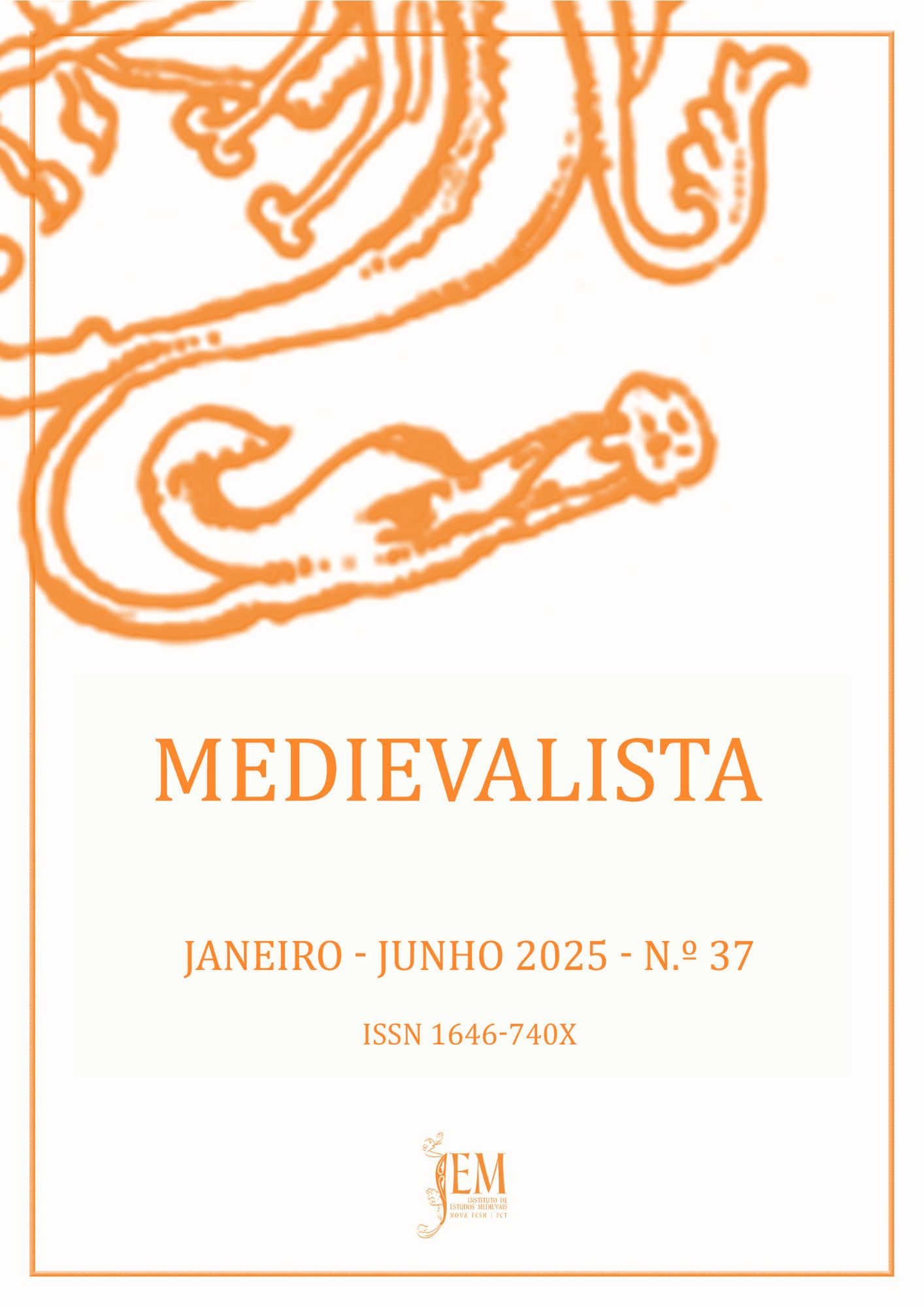
Medievalista 37 - Dossier: "What survives after death? Parish Communities and Death Commemoration Strategies in the Medieval City – In memoriam Clive Burgess"
No. 37 (2025)Faz parte da condição humana a consciência do paradoxo fundamental da vida, marcada pela fragilidade e pela finitude, mas também por uma força imparável de renovação e de superação, de desejo de ultrapassar a voragem do tempo e evitar o esquecimento. Recordar, fazer memória, celebrar e ter memória em conjunto, foram, desde sempre, formas não apenas de resgatar as vozes e os feitos do passado, mas também de os fazer actuais, tornando-os de novo significativos, eficazes. Por isso os documentos fizeram-se monumentos, determinados sítios tornaram-se lugares de memória, as datas, os sítios e os eventos foram rememorados por gestos e ritos socialmente significativos, capazes de os tornarem actuais, em toda a sua força simbólica. O modo como se recorda, e, sobretudo, como as sociedades recordam, combina a capacidade de guardar e transmitir a memória, de a evocar e comemorar, ou de a fixar em ritos, lugares ou narrativas.
-
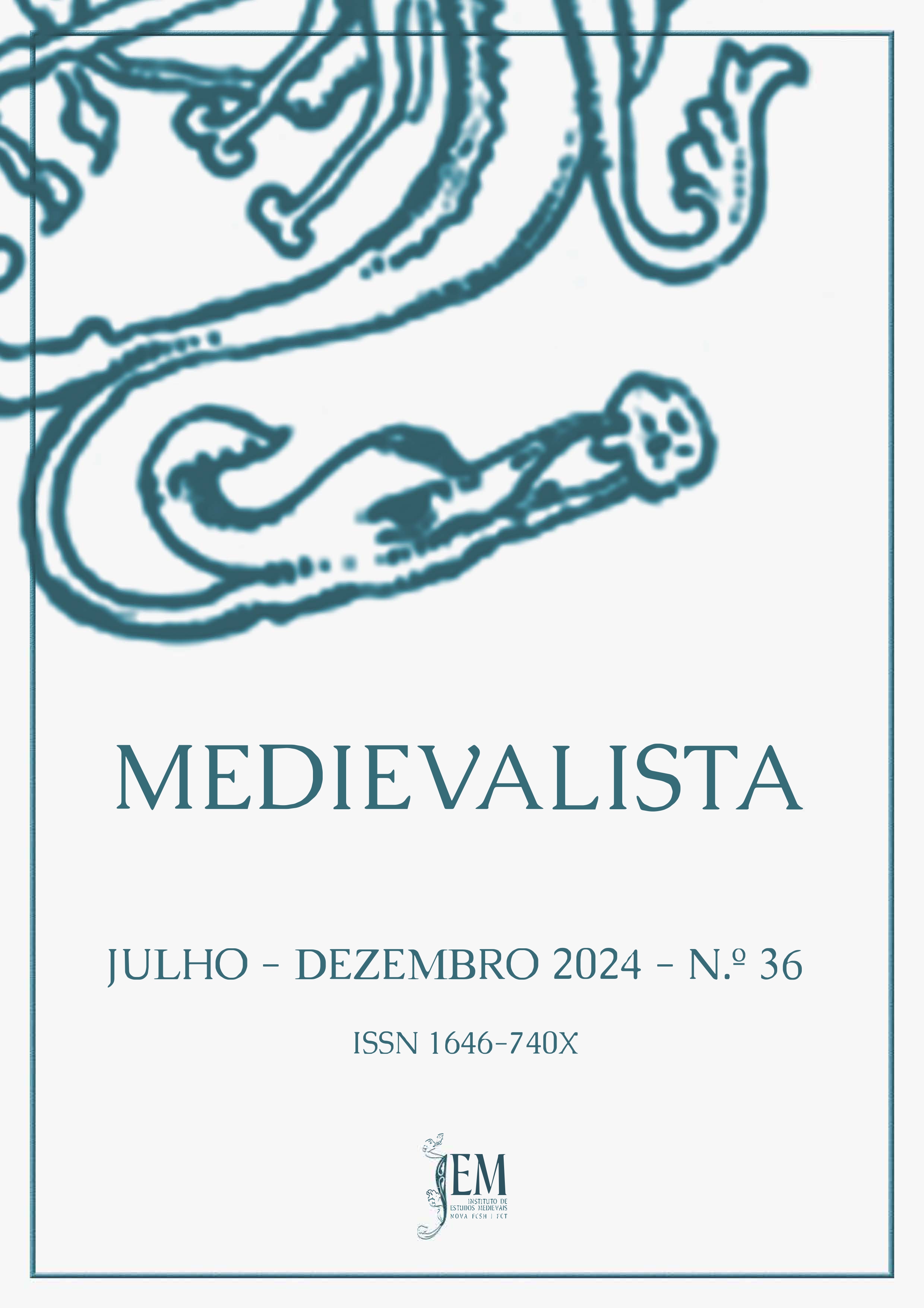
Medievalista - Dossier "Diplomacia dos Príncipes Herdeiros"
No. 36 (2024)In 2024, the Institute of Medieval Studies (IEM) celebrated twenty years of existence as a research unit. With some delay, it is true — it was in 2002 that the first FCT evaluation was presented —but perhaps inevitable when studying an era that had a different conception of time but which knew how to appreciate the value of rituals and ceremonies. As a rule, this was done. From the outset, the celebration was a commemoration, a community remembrance of the founders of the Institute and their heritage, accompanied by the evocation of the IEM's journey and the achievements and successes it had achieved in that period. Everything was remembered on the Institute's renewed portal (https://iem.fcsh.unl.pt/20-anos-iem/), using photographs, posters, and testimonies from researchers from other units and institutions, within and outside the country.
-
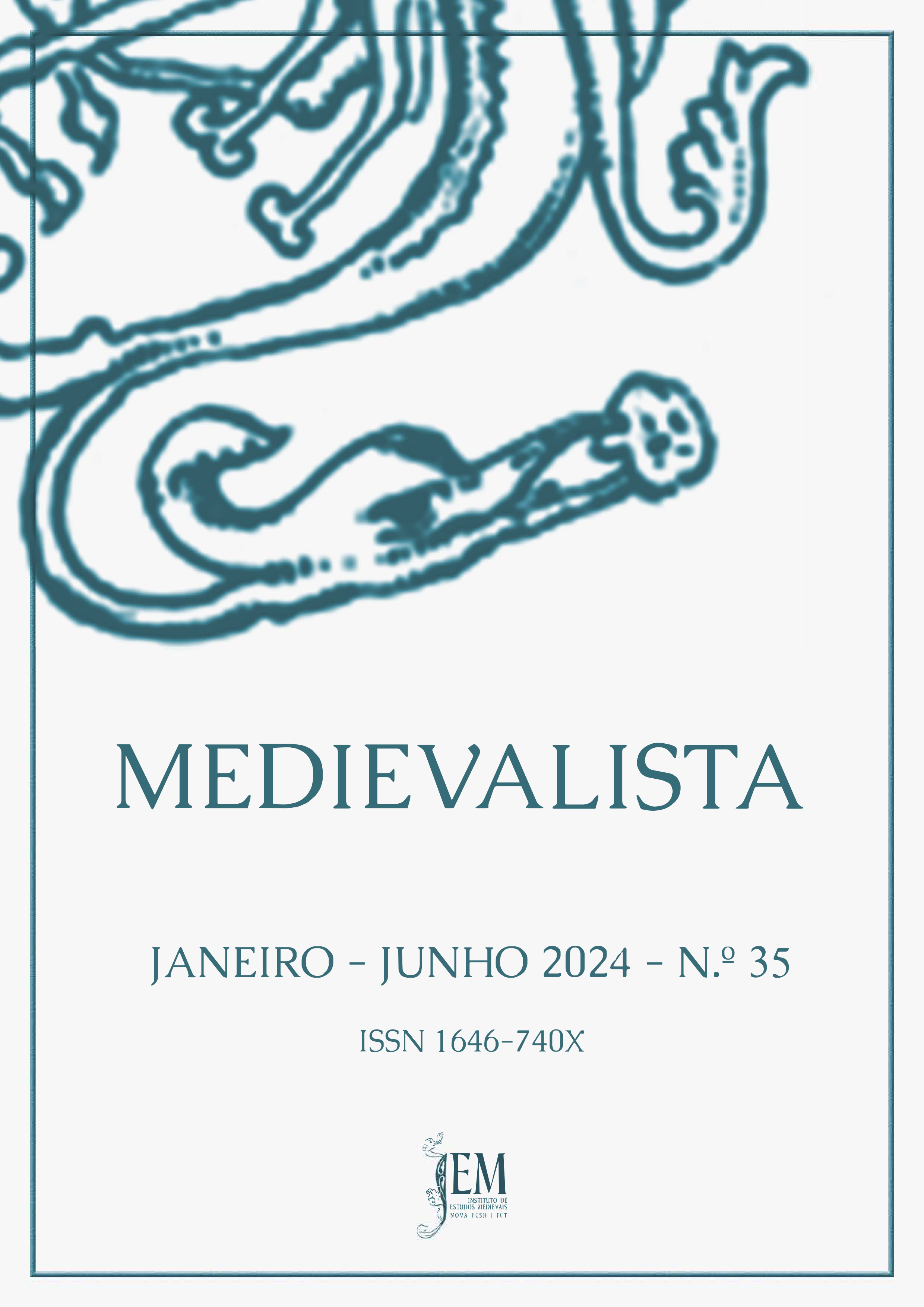
Medievalista 35
No. 35 (2024)Viva a Medievalista! Nem mais, nem menos. Foi assim mesmo, com estas palavras, que o Professor José Mattoso terminou, em Novembro de 2022, uma mensagem que dirigiu à Redacção da revista. Felicitava-a então pela qualidade do nº 32, o último publicado em Julho desse ano, e pelos contributos que a revista do IEM trazia para a renovação da investigação sobre a época medieval. Não era isto uma novidade – em anos anteriores, já fizera comentários elogiosos sobre o rumo da revista e do instituto —, mas era por certo a primeira vez que se manifestava com tal entusiasmo, atitude mais rara em quem cultivava a contenção dos gestos e a moderação. Havia talvez boas razões para tanto, das mais recentes às mais antigas.
-
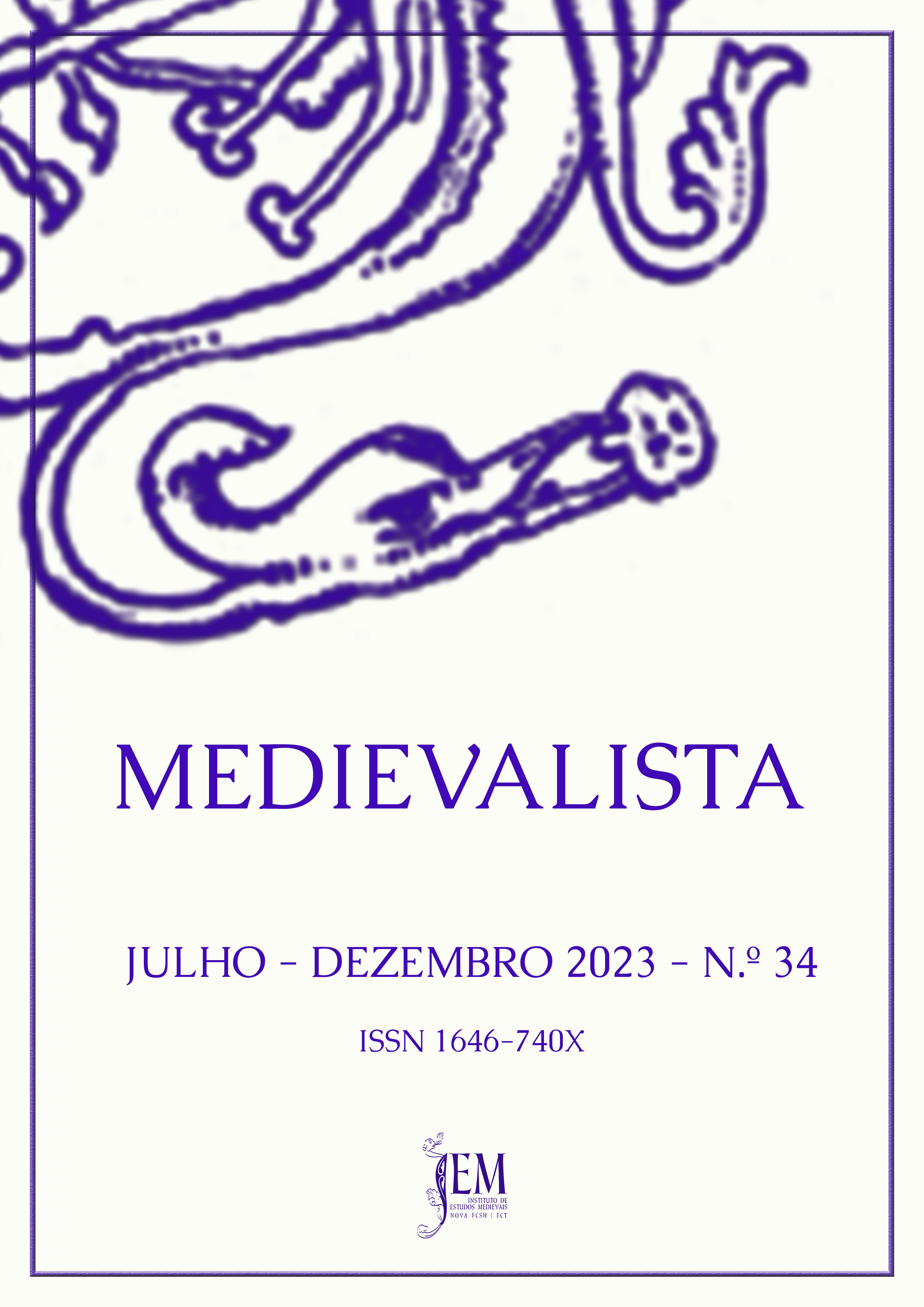
Medievalista - Dossier "Medieval Chronicles"
No. 34 (2023)Vem a lume um novo número da Medievalista, numa data em que, encerrado o ano lectivo, se começam a fazer planos para um tempo de descanso, de encontros e de maiores demoras na fruição das coisas e, para muitos, na visitação de livros, ensaios ou mesmo textos mais breves que ficaram em lista de espera por causa das urgências da vida académica e profissional. São por vezes textos mais antigos, familiares, que agora se revisitam, como num diálogo com autores, personagens e lugares, que de algum modo se tornaram próximos, quase fazendo parte de quem os leu.
Em certa medida, é também esta a aproximação que se propõe em muitos dos artigos reunidos neste número, aplicada a textos e autores de geografias e de cronologias diversas, que procuraram construir uma determinada memória do passado, uma narrativa dos acontecimentos tornados mais significativos pela situação vivida por quem os organizou e redigiu, ou pelas instituições em que estes se inseriam. Longe da ingenuidade positivista que neles procurava sobretudo a identificação dos factos que, depois de situados no tempo e numa sequência de causa-efeito, permitiam uma reconstituição objectiva do passado, do que efectivamente se passou, a investigação actual, aprofundando os diálogos com outras disciplinas, da literatura e da filologia aos estudos culturais, veio mostrar a complexidade desses processos de construção da memória do passado. Em particular, a necessidade de os ler e interpretar à luz dos respectivos contextos de produção, das agendas de cada autor, mas também das múltiplas intertextualidades a que muitas vezes apelam, ou nas quais se suportam e se legitimam. Como se esta arqueologia dos textos não dispensasse a recuperação da história destes, nem dos autores por detrás deles…
-
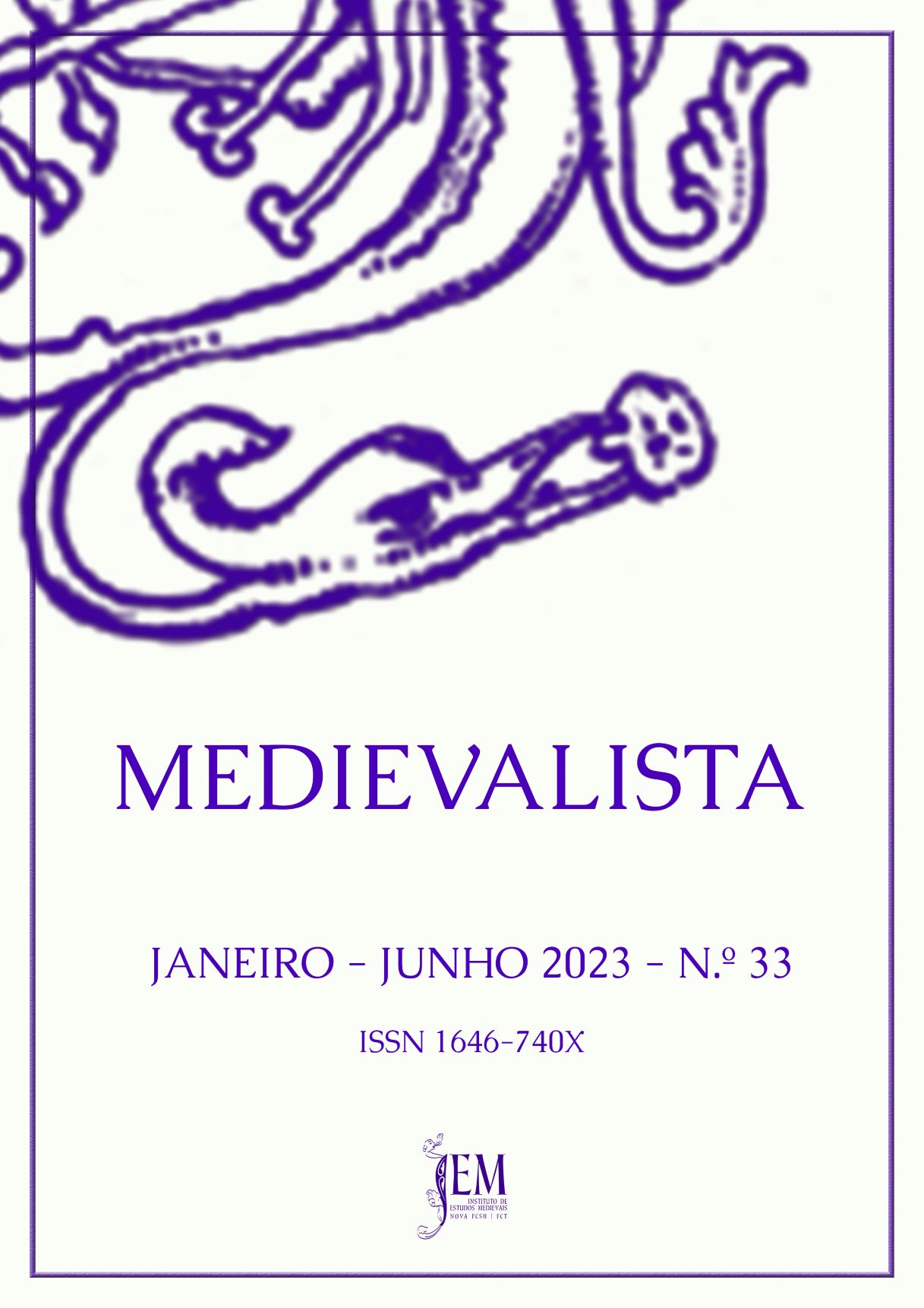
Medievalista - Dossier “The castle of Belvoir and the fortified architecture of the military Order of St. John”
No. 33 (2023)This Medievalista remembers Ana Cristina Lemos, another young researcher from the Institute for Medieval Studies who died prematurely. A specialist in the study of illuminations and a pioneer in research on color, she was responsible for the analysis of the Livro de Horas de D. Duarte, and, above all, for the discovery and appreciation of the collection of the Livros de Horas of Palácio de Mafra. As the texts published below, which pay a last and moving tribute to her, remind us, Ana Lemos was more than a competent researcher. She was not only a teacher attentive to the integral formation of her students, but also a committed citizen, with a life of militancy for civic, artistic, and cultural causes. In her own way, she did justice to the old lesson of Marc Bloch, who advised historian apprentices to live the life of their time in order to understand and decipher the remains of the lives of the past. Both for making history and for making it happen every day, it was almost inevitable that Ana Lemos would leave a vivid impression on the lives and memories of her colleagues, friends, and teachers. As do the colors she loved so much.
Complete issue [PDF]
-
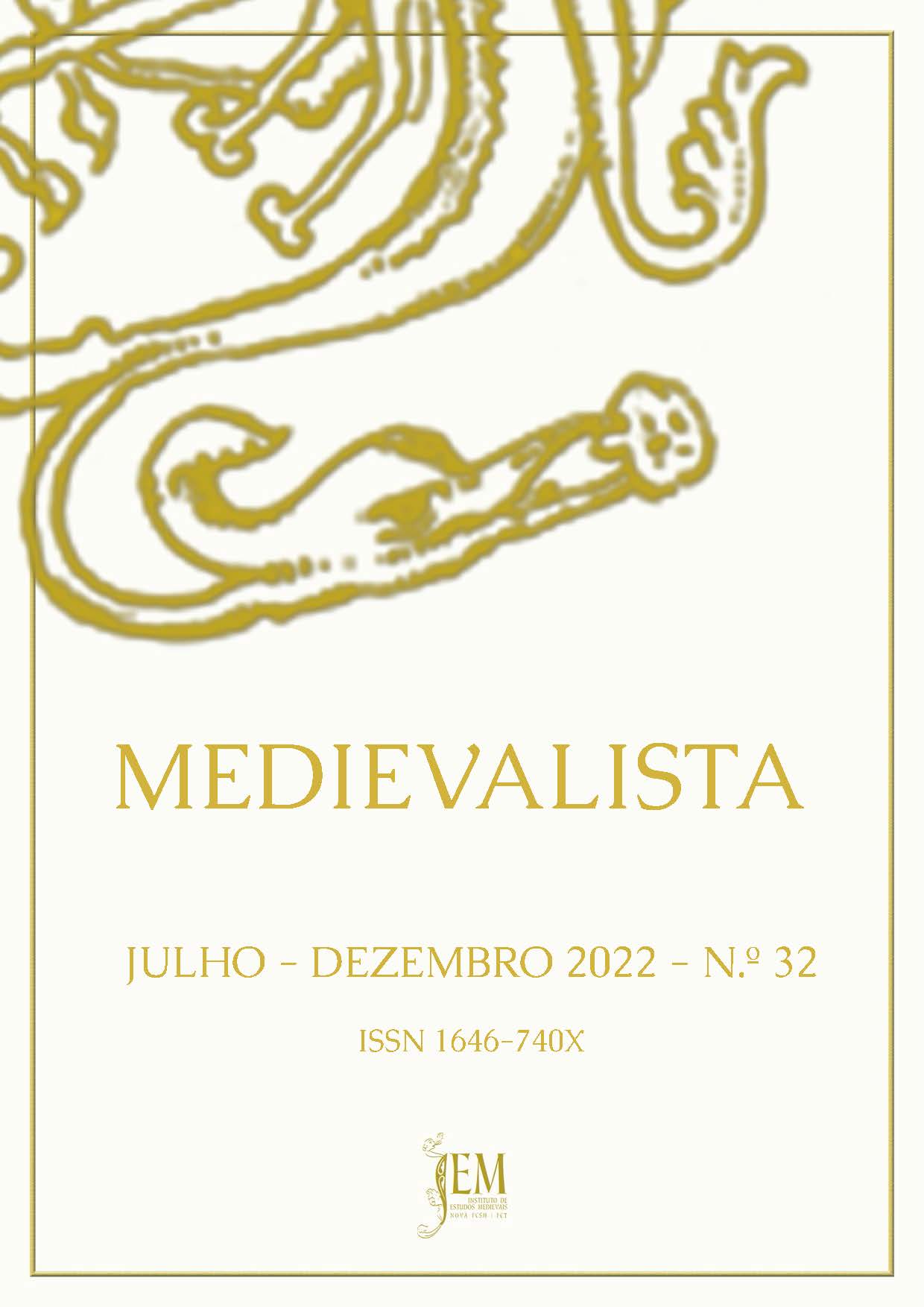
Medievalista
No. 32 (2022)Medievalista has long sought to establish itself as a journal of reference in the field of medieval studies. With the regular publication of two issues per year, always free of charge and without any costs for authors and readers, it is invested in the creation of an international platform for the dissemination, share and debate of ideas and perspectives. Through the publication of innovative studies, it aims to cross different disciplinary areas and transpose the most diverse historiographical traditions in order to bring together the distinct geographies of study and research in medieval studies. This has been Medievalista's vocation in recent years, in a drive to revitalize the frontiers of knowledge and disciplines in the best way possible, an aspect that is, by the way, a common heritage of the Institute of Medieval Studies.
Complete issue [PDF]
-
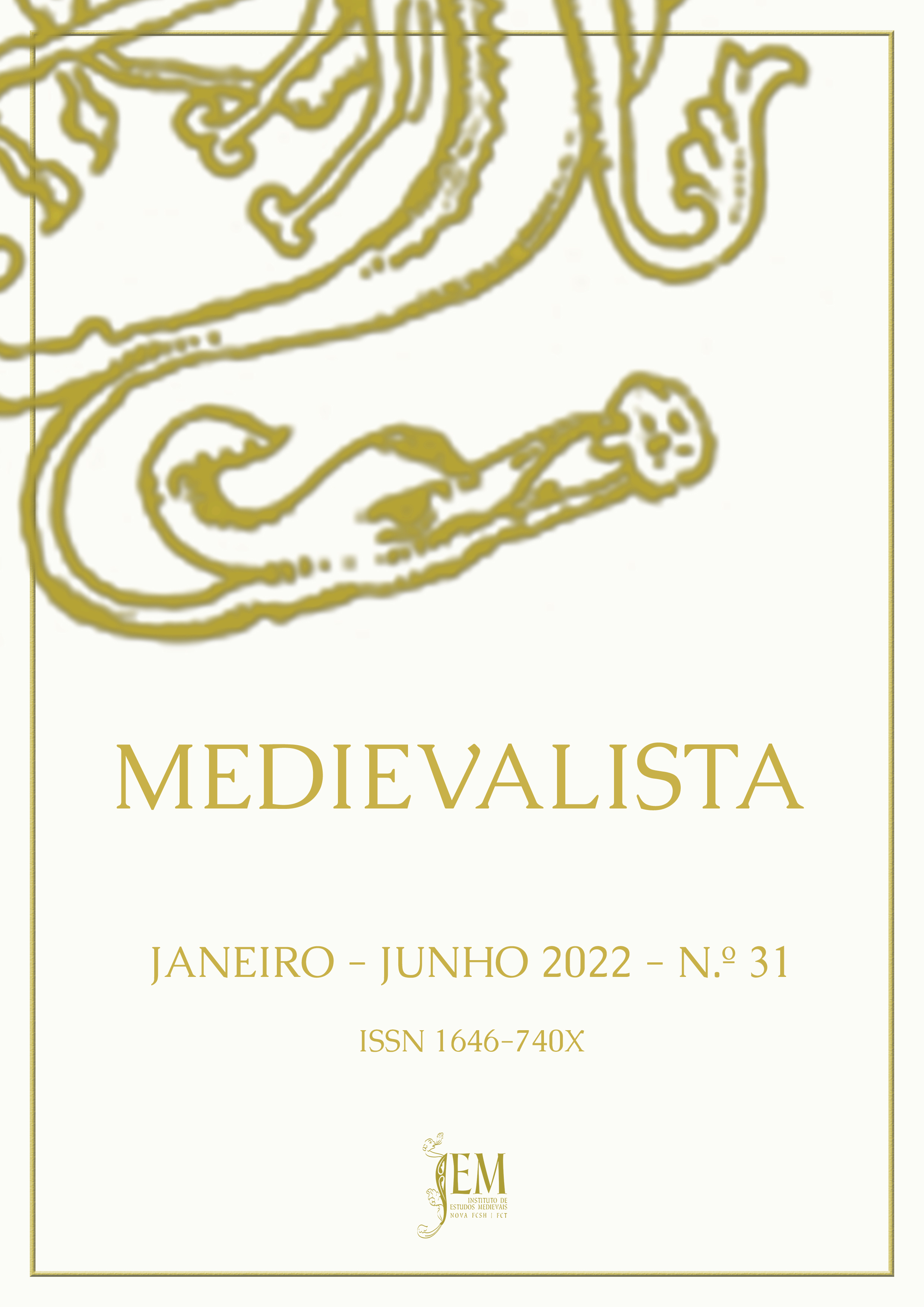
Medievalista - "Peninsular Exchanges" Thematic Dossier
No. 31 (2022)This issue of Medievalista features an interesting essay on the Contemplative History of José Mattoso. It also includes a very significant number of texts, initiatives and ongoing research of different types and origins, each of them a testimony of the different ways of making and communicating science in the field of Medieval Studies. With them, the journal keeps on consolidating its presence as a space for diffusion, debate and sharing of knowledge, doubts and questions, in an open access platform, free of any charges for either readers or researchers. As always have been done at Medievalista and will always be done in the future.
Complete issue [PDF]
-

Medievalista - "From the East to the West: The Military Orders" Thematic Dossier
No. 30 (2021)This edition opens with yet another note of regret, motivated by the disappearance of three illustrious researchers: José Marques, Filomena Barros and Helena Avelar: three names who leave a very significant legacy in several fields, from the history of the Church and ecclesiastical institutions to ethnic-religious minorities and the complex study of their relations with the Christian majority, or even astrology and its important role in the framework of medieval worldview and scientific knowledge.The body of this issue is formed by a thematic dossier, coordinated by Luís Filipe Oliveira and Gregory Leighton, on the world of military orders. The remaining articles, reviews, thesis presentations and news items show and extend the diversity and plurality of themes and perspectives, as well as attest to the vitality and resilience of medieval studies in times of pandemic.
Complete issue [PDF]
-

Medievalista - "The Medieval Bestiary" Monograph
No. 29 (2021)This issue opens with a note of regret, as Peter Linehan passed away on July 9, 2020. The body of this issue is formed by a monograph on the Medieval Bestiary, coordinated by Adelaide Miranda and Pedro Chambel. Some of the texts are written by renowned authors, but many others belong to younger researchers, from different countries and other historiographies. The fixed sections of the review share the same diversity of origins, themes and perspectives. Through them, we try to set forth the resilience and creativity of the medieval studies in pandemic times, as well as the possibility of converting the current difficulties into an opportunity for greater sharing and debate.
Complete issue [PDF] -

Medievalista
No. 28 (2020)This issue of Medievalista brings some news. The most decisive ones were the simplification of its title - Medievalista on-line became Medievalista -, the adoption of a new management and editing platform and another renewal of the graphics in which the journal presents itself. Without abandoning the legacy of the past, particularly the openness to researchers from other languages and historiographies, the current issue integrates again a thematic dossier on the role of ecclesiastics in the construction of medieval monarchies. It also has three other articles on different topics from authors outside the peninsula, in addition to the usual headings, such as news, reviews and presentations, with the aim of a more comprehensive and systematic character, which will be done from now on.
Complete issue [PDF]
-

Medievalista
No. 27 (2020)In the previous issue of Medievalista, published on the 1st of July 2019, we have mentioned in the Editorial that the announcement of the results of the evaluation process of the Portuguese Research Units by the Foundation for Science and Technology (FCT) would soon be published. For what concerns the Institute of Medieval Studies (IEM), the work carried out during 2014-2017 and the Strategic Project proposed for 2019-2022 deserved the classification of "Excellent". This is a result that honours the IEM, its Direction, and all those who develop research in it. Their joint efforts and the quality of their initiatives and research are thus recognised. However, this is also a factor of increased responsibility for our Institute, and for each and every one of its members. The increase in public funding due to the change from the previous classification ("Very good") to the one now assigned, despite not allowing for extravagances, will enable some relief from past constraints, both in fundamental research and, for example, in the functioning of our journal.
DOI: https://doi.org/10.4000/medievalista.2771
This journal is funded by national funds: Base funding, with reference UIDB/00749/2020, and Programmatic
funding, UIDP/00749/2020, from the Institute for Medieval Studies. -
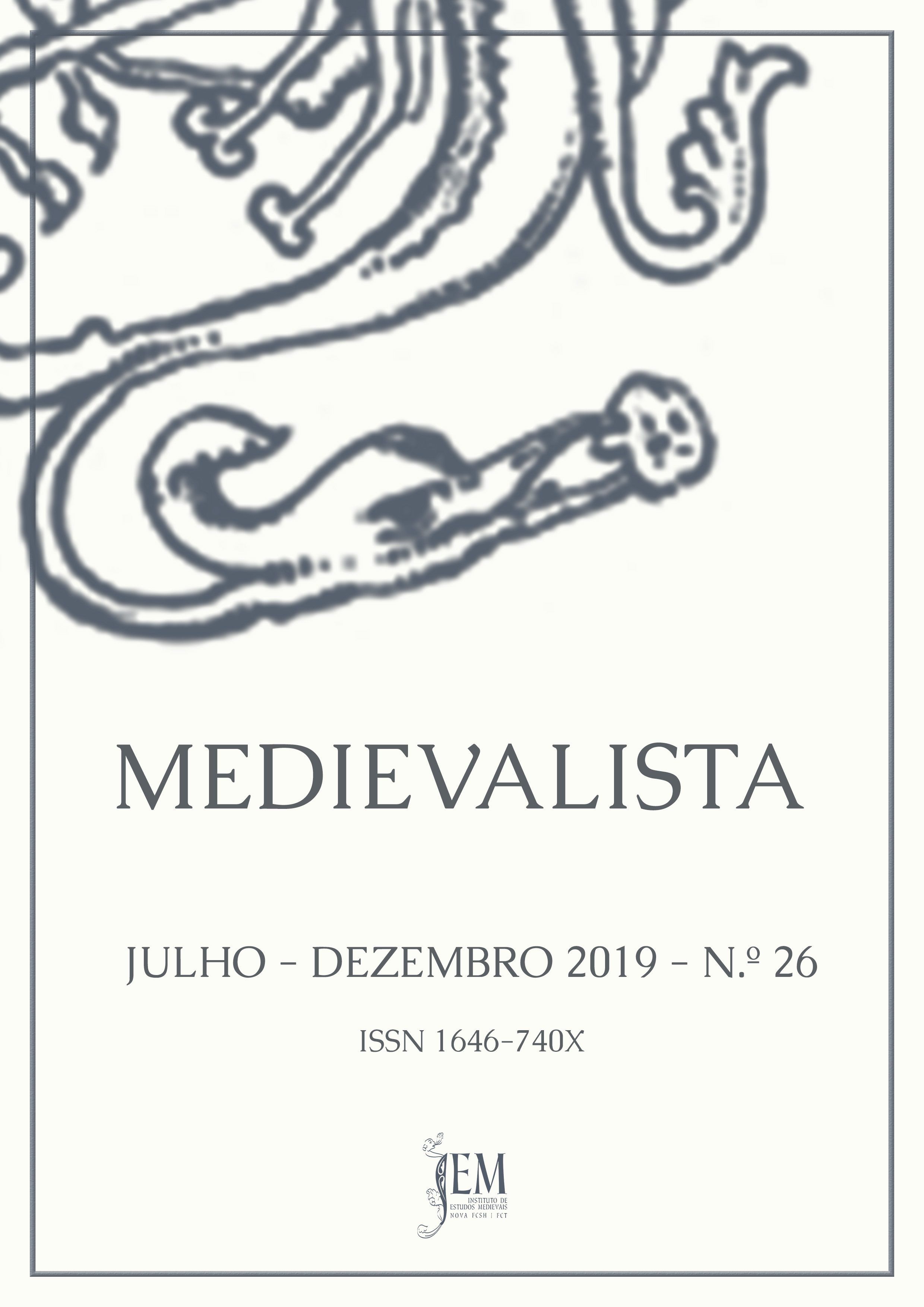
Medievalista - "Medieval Europe in Motion. The Middle Ages: a Global Context” Thematic Dossier
No. 26 (2019)This issue's thematic dossier is a direct outcome of the conference "Medieval Europe in Motion. The Middle Ages: a Global Context". Its organizers endeavored to bring together scholars to debate on one of the lines of IEM’s strategic project: "People and Knowledge in Motion: Medieval Portugal in Trans-European Networks". The aim was to discuss and reassess research related to mobility, circulation of models, and global phenomena in the Middle Ages, such as the polychrome Romanesque wood carvings in Europe. The articles included in this issue of the journal reflect the concern of researchers with the study of these sculptures, drawing attention to the importance of polychromy in works that appear to us today as a pale image of their original reality.
DOI: https://doi.org/10.4000/medievalista.2271
-
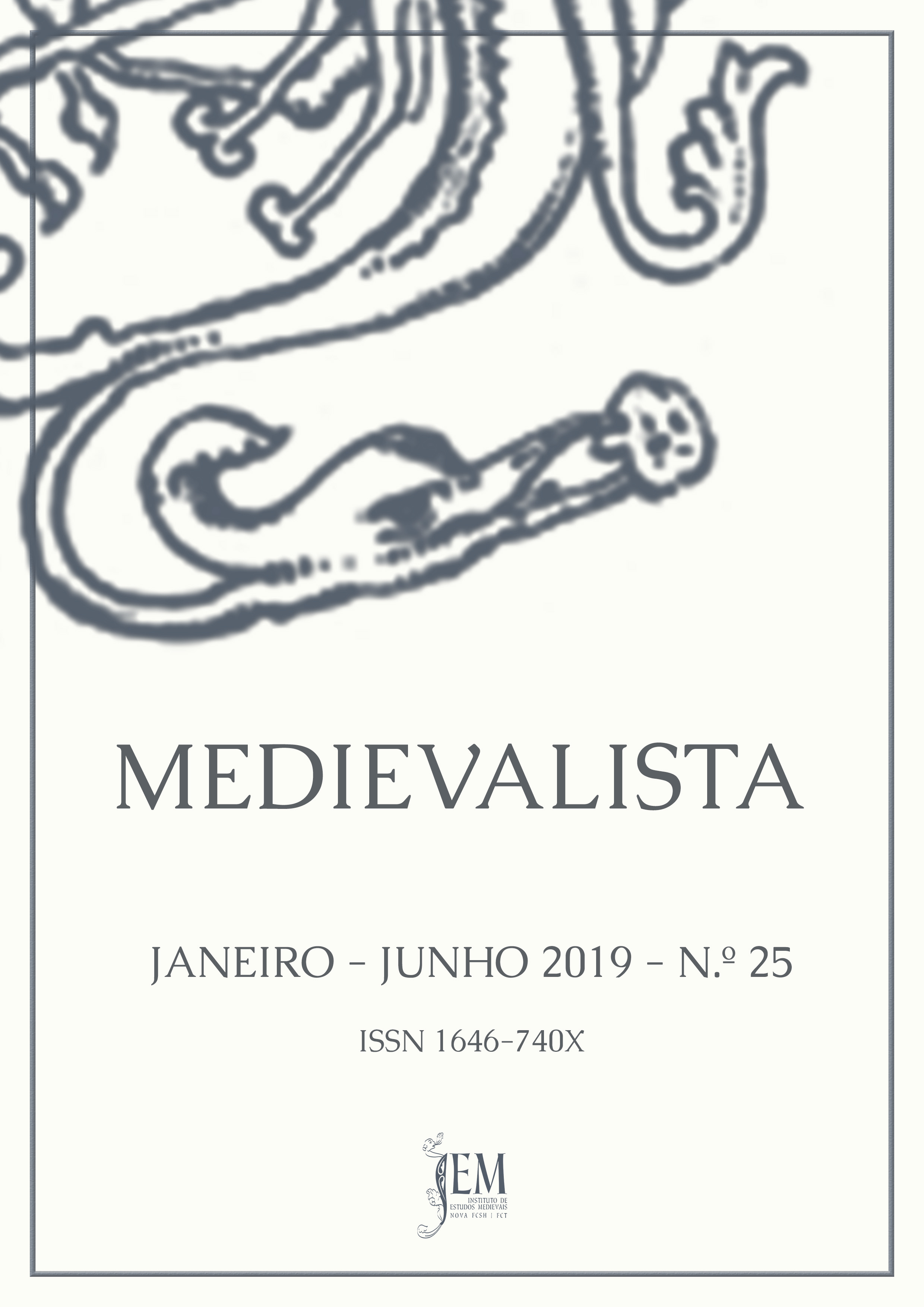
Medievalista
No. 25 (2019)This issue features an important Highlight: the study on "The kitchen and the table in medieval Loulé through its common utensils: the testimony of the orphanological inventories" by Iria Gonçalves. The section Articles includes contributions by William Trouvé on "The route of a list. From Visigothic Hispania to Beneventan Italy, from Liber Iudiciorum to Pseudo Isidore", by Ana Luísa Sonsino on "The readers of Espelho de Cristina: a clip of the courts", by Lídia Amor on "Delectare ed prodesse: adventures, pleasures, and didacticism in the Conte du Papegau", and by Mário Farelo on "Roland Scriptoris or of Lisbon: a Portuguese 15th Century Physician, Professor, and Clergyman". The remaining sections include equally varied topics.
DOI: https://doi.org/10.4000/medievalista.1718
-
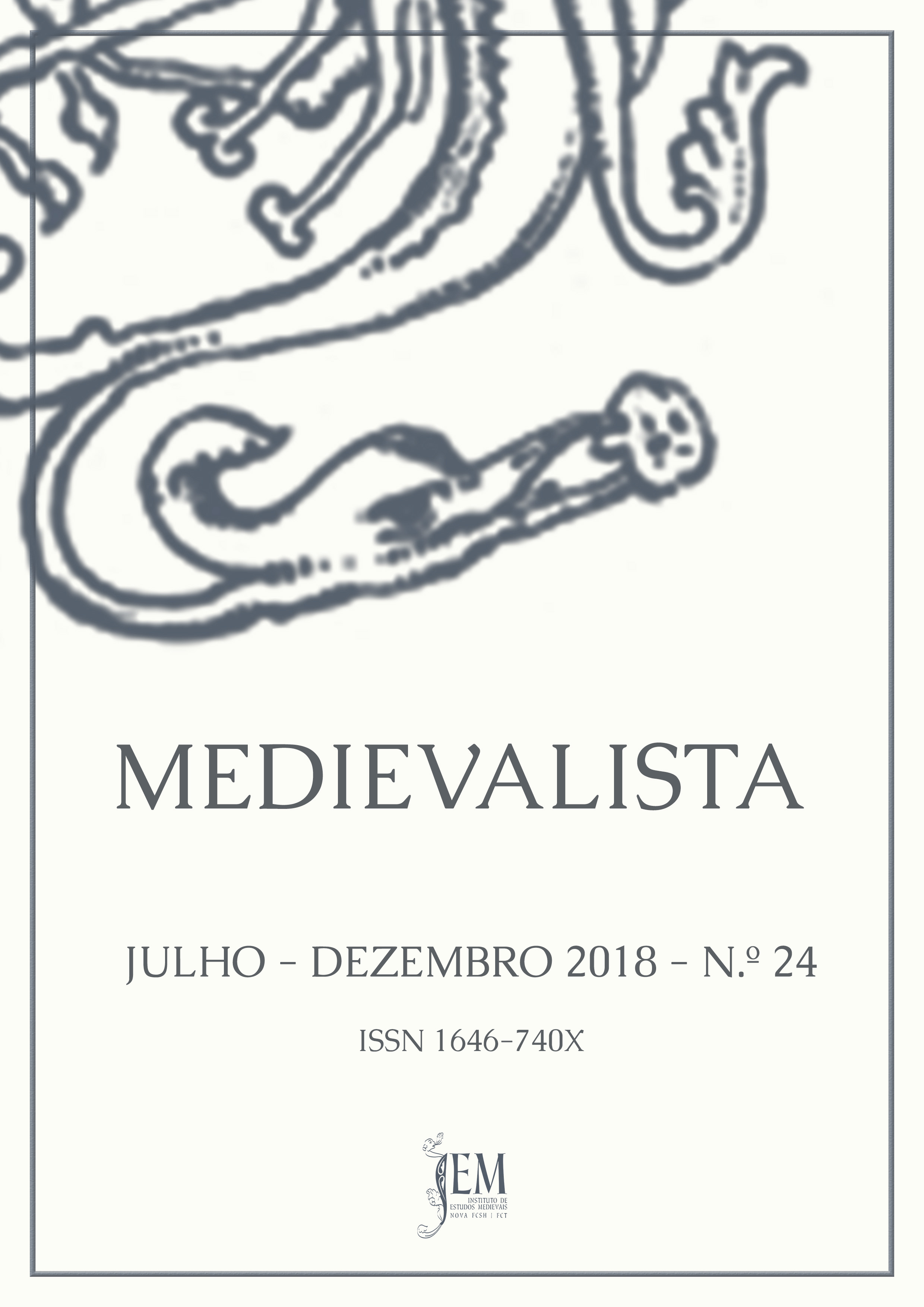
Medievalista
No. 24 (2018)Faithful to the commitment to publishing regularity, this 24th issue of Medievalista OnLine reasserts its option for diversity, both in the themes of the articles and in the historiographic orientation of their authors. In the wide range of Medieval Studies, the journal welcomes both the work of renowned historians and the contributions of young researchers. The only criterion we apply is that of the quality and interest of the articles. In addition to the editorial orientation that we have followed since the beginning of the journal, the external evaluation of the papers proposed to us for publication (an evaluation carried out by specialized referees and according to international criteria) aims at achieving the maximum objectivity and an additional guarantee of the quality of the published articles.
-

Medievalista - "Debuerit habere regnum. Legitimacy in Medieval Monarchies" Thematic Dossier
No. 23 (2018)This issue of Medievalista is a special edition. It does not break the absolute regularity of the journal’s publication, nor does it change the format to which authors and readers are accustomed. Faithful to our requirements in this field, the issue comes out on schedule, at the beginning of the semester to which it refers. It is special because, although discussed and thought of several times, never before had it been possible to prepare and to offer a real thematic dossier. Thanks to the work and collaboration of the organisers of the conference "Debuerit habere regnum. Depor e proclamar reis na Idade Média", which took place at the Faculdade de Letras de Lisboa from October 12th to 14th, 2016, and the availability of a wide range of authors, several of the papers presented there are published here, after having been submitted to the peer-review process.
-
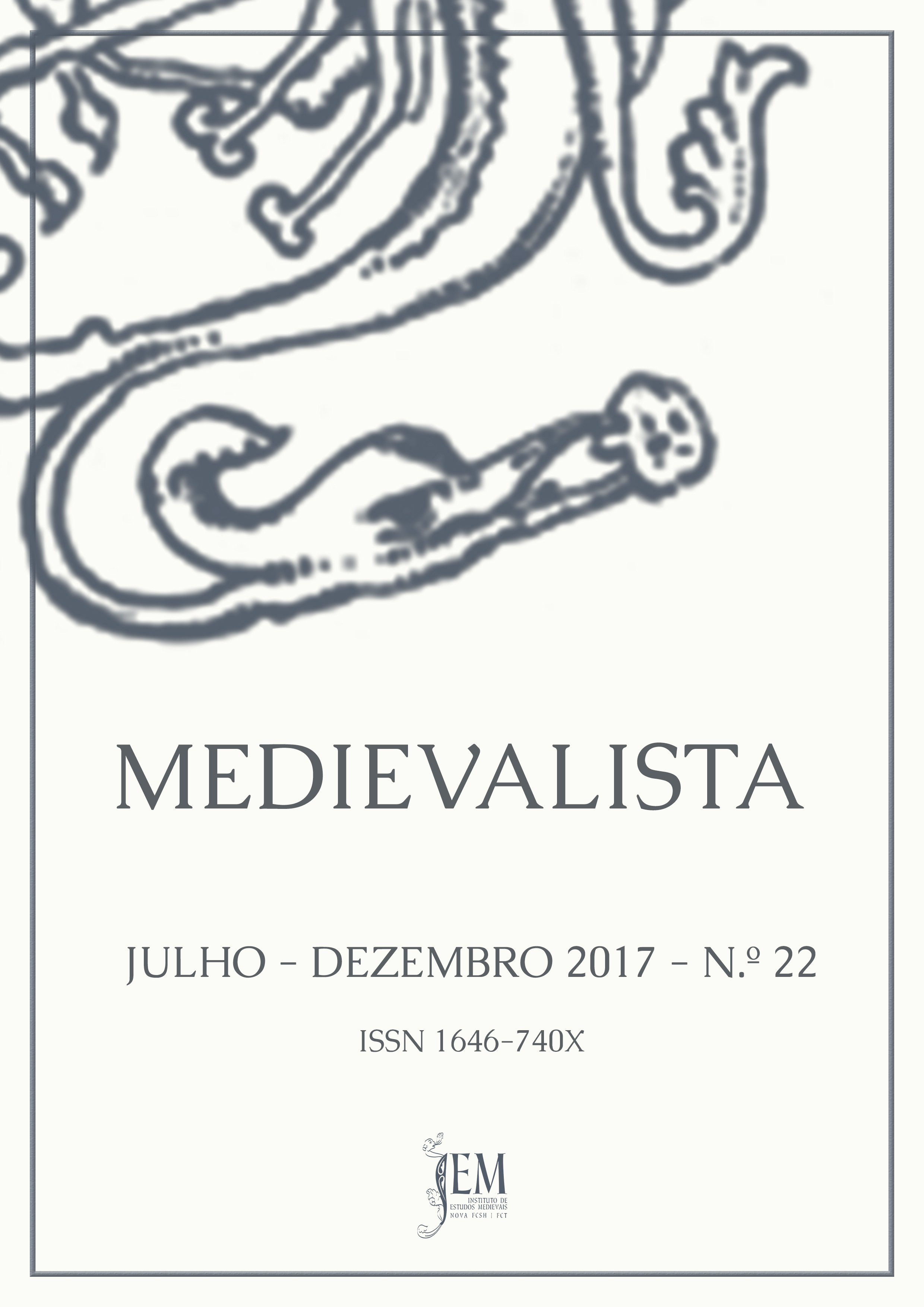
Medievalista
No. 22 (2017)Being open to both established authors and young researchers, it is not always easy for Medievalista to reach a compromise that meets the demands of the scholars of Medieval Studies who access our journal. The multiple tasks of the older researchers and the overwhelming curricular needs of the younger ones naturally result in more proposals from the latter than from the former. But the importance of the Masters' lesson has never ceased to be very present in the minds of those who make our journal. Hence the pleasure we have in publishing in this issue the article by Iria Gonçalves entitled "A contribution to the study of a manorial right in the medieval lands of Alcobaça: the ‘montado dos porcos’", presented as Highlight.
-
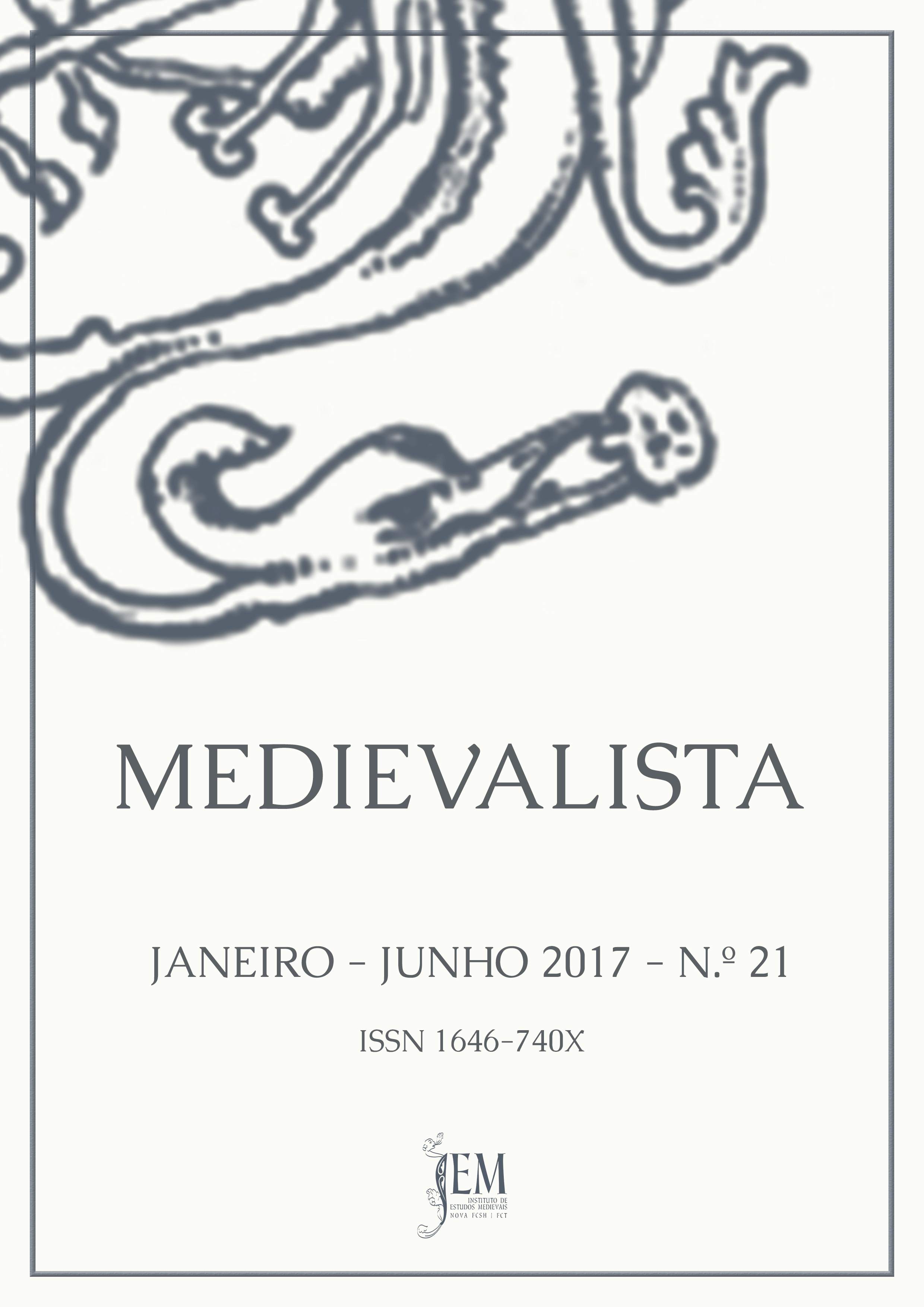
Medievalista
No. 21 (2017)The present issue of Medievalista continues in the direction that has been followed since its beginnings, welcoming works with different themes, by authors with distinct historiographical positions and coming from very different countries, linguistic traditions, and institutional affiliations. This pluralism, which is a hallmark of our journal, has been fundamental in continuing to attract readers and, above all, authors who submit articles for publication. Counteracting the strong endogamy usually associated with historiographical journals, the vast majority of researchers who propose to publish in Medievalista do not belong to the Institute of Medieval Studies but recognize it as a trustworthy entity for the dissemination of their research.
-
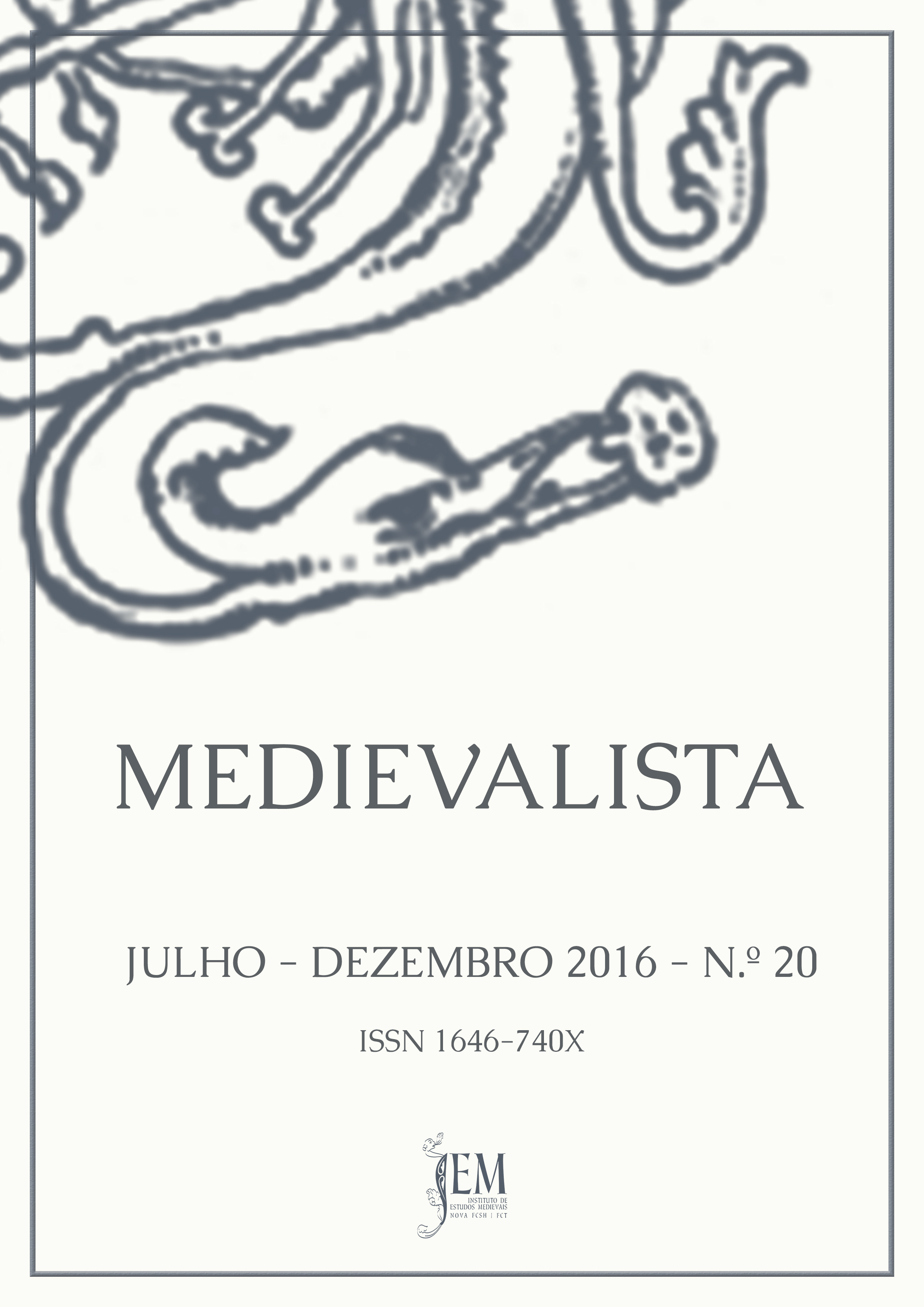
Medievalista
No. 20 (2016)This issue of Medievalista OnLine highlights a conference by Arsenio Dacosta, entitled "Geografías imperfectas: linaje y poder en la obra de Luís Krus", delivered at the colloquium held in Lisbon in October 2015, on the 10th anniversary of the death of the founder of the Institute for Medieval Studies and first Director of our journal. It is followed by a set of five "Articles" on various topics, the usual "Reviews" section, the presentation of the doctoral thesis of Joaquim Bastos Serra, and, in the "Varia" section, a tribute of the French medievalist Jean Favier, by Armando Luís de Carvalho Homem.
-
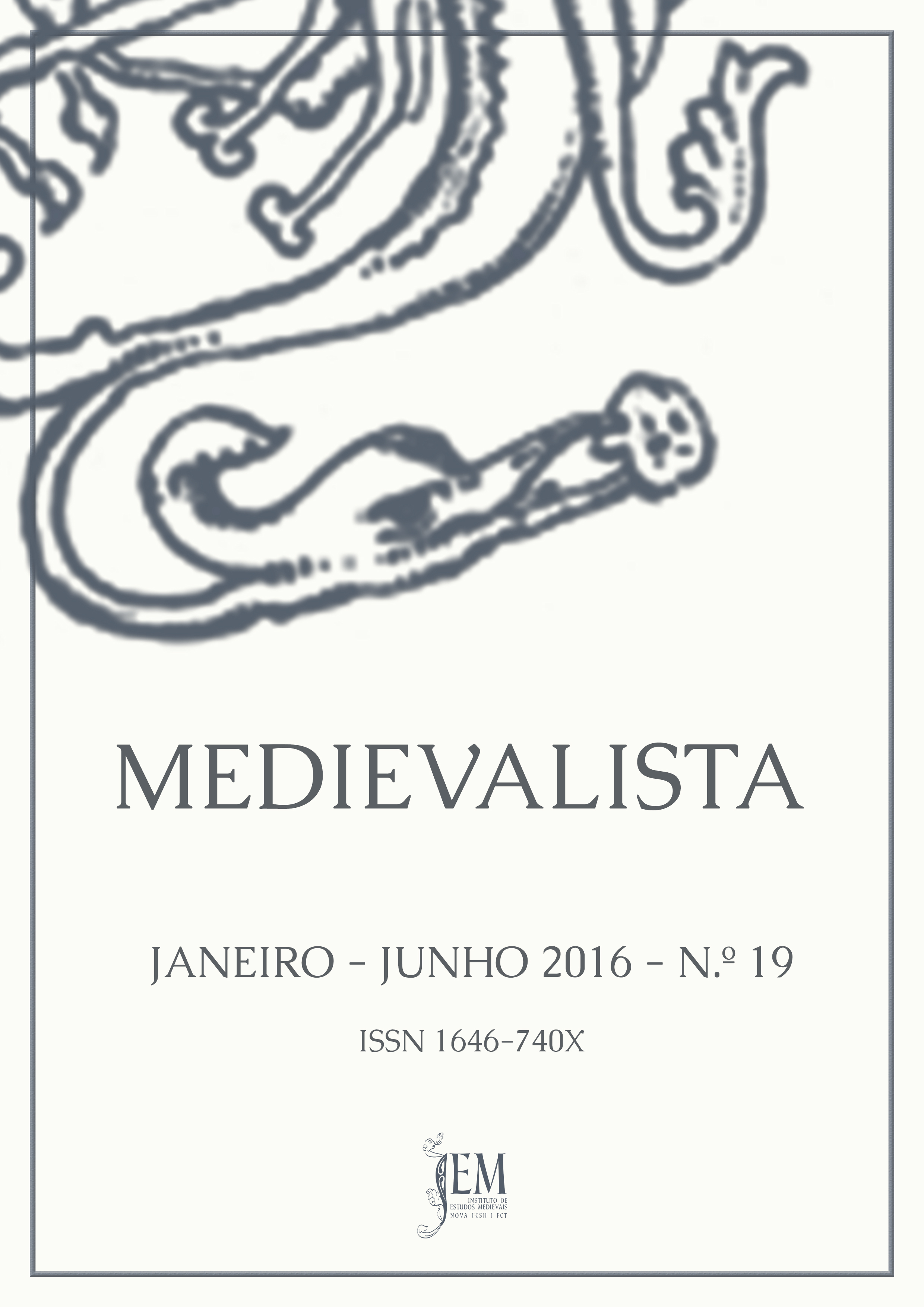
Medievalista
No. 19 (2016)In 2015 Medievalista completed ten years of regular publication, with a biannual periodicity from 2008 onwards. More than celebrating the anniversary, the editorial team wanted to reflect on the path taken since the journal was launched thanks to the initiative and under the direction of Luís Krus. Such reflection would be limited if it were closed in on itself: Medievalista, although specialized in the field of Medieval Studies, fits into the broader area of the Social Sciences and its periodicals. The International Seminar on "Social Science Journals and their Challenges", presented in this issue, brought together representatives of several journals, gave rise to a wide exchange of ideas, and promoted the survey of some of the most relevant problems currently faced in this field.
-
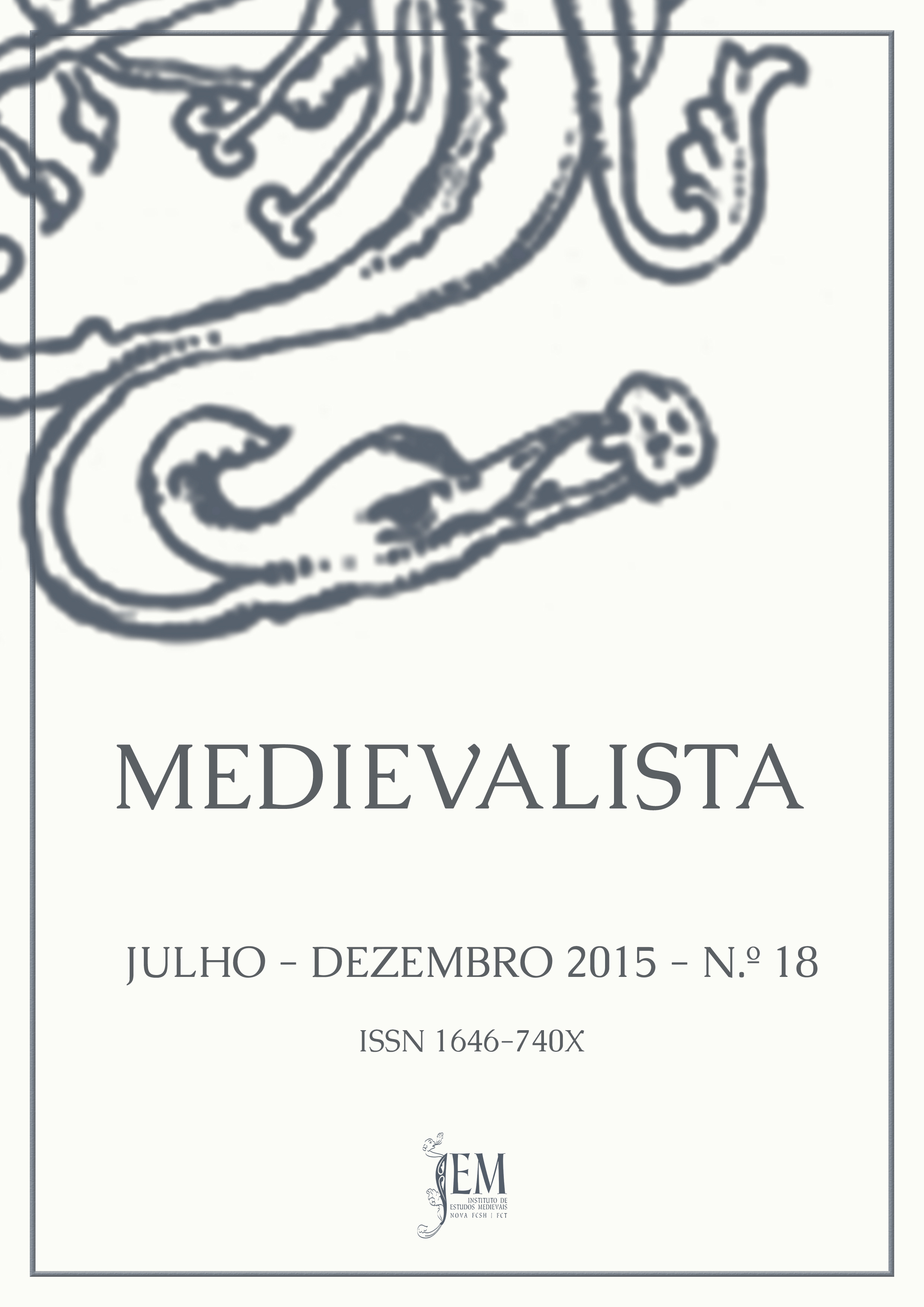
Medievalista
No. 18 (2015)Medievalista OnLine, founded in 2005 to fulfill a project deeply cherished by the late Prof. Luís Krus, already has eighteen issues and ten years of existence, many dozens of original articles, some critical reviews (albeit not as many as one would wish), much varied information of historiographic nature, tributes to renowned Portuguese and foreign medievalists (some obituaries), news of colloquia and scientific meetings, and many other articles. Alongside texts by historians with an established name in national and international academic circles, there are also articles and contributions by young researchers who dare to broaden the knowledge of History by exploring new themes or revisiting old problems.
-
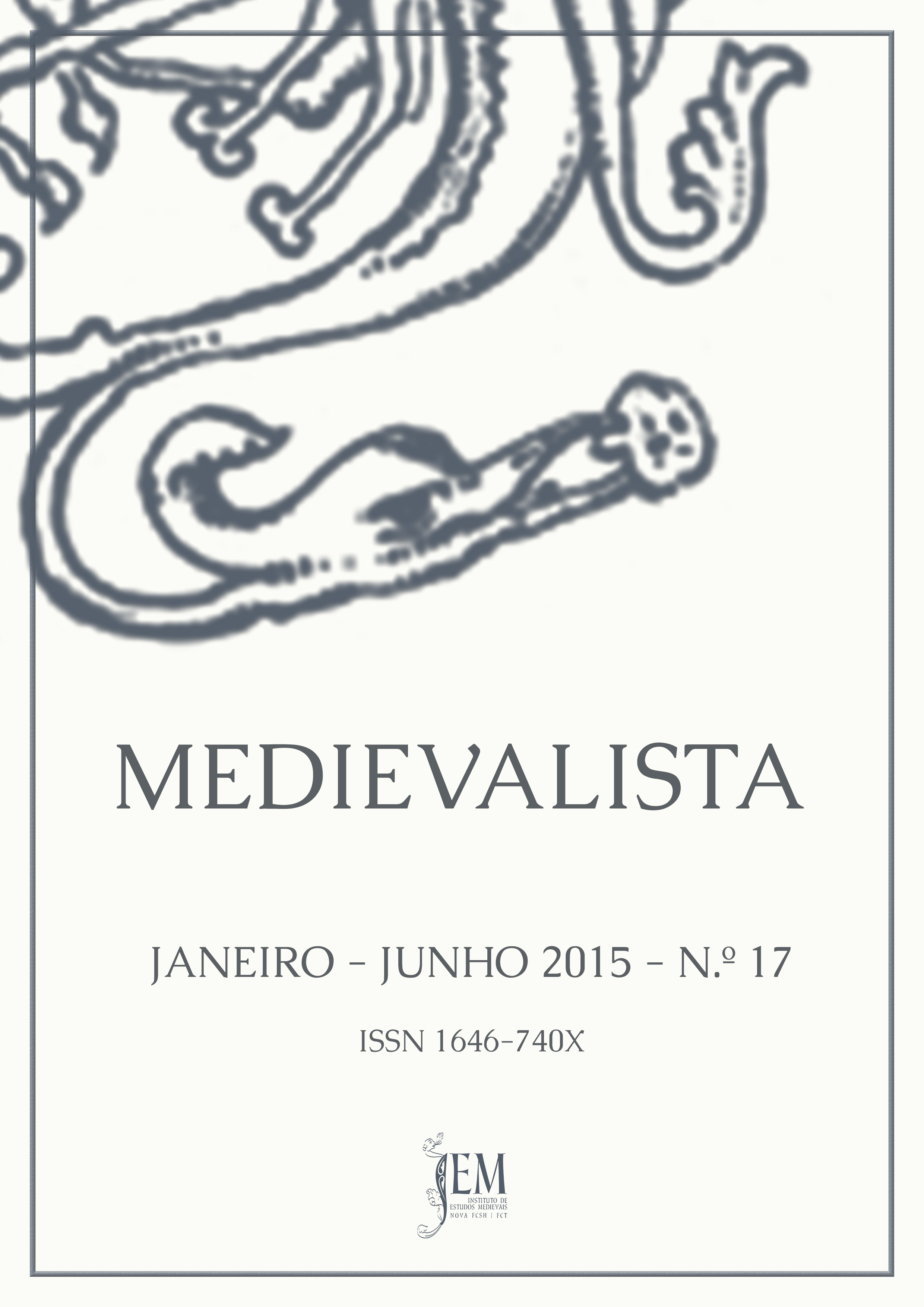
Medievalista
No. 17 (2015)This year marks a decade since Medievalista was first published. A biannual journal since 2008, it has since then maintained a regularity that is unusual in the panorama of national scientific publications. Without triumphalism, but also without false modesty, we believe it is adequate to celebrate these ten years. This issue also marks the beginning of a couple of initiatives with that purpose. The Highlight, written by Maria Adelaide Miranda and Pedro Chambel, evokes the launching of the magazine under the initiative and enthusiasm of its founder and first director, Luís Krus. No one better than them, the two senior members of the Editorial Board, to recall the context, the limits, and the ambition that surrounded the creation of Medievalista, as well as how far it has come.
-
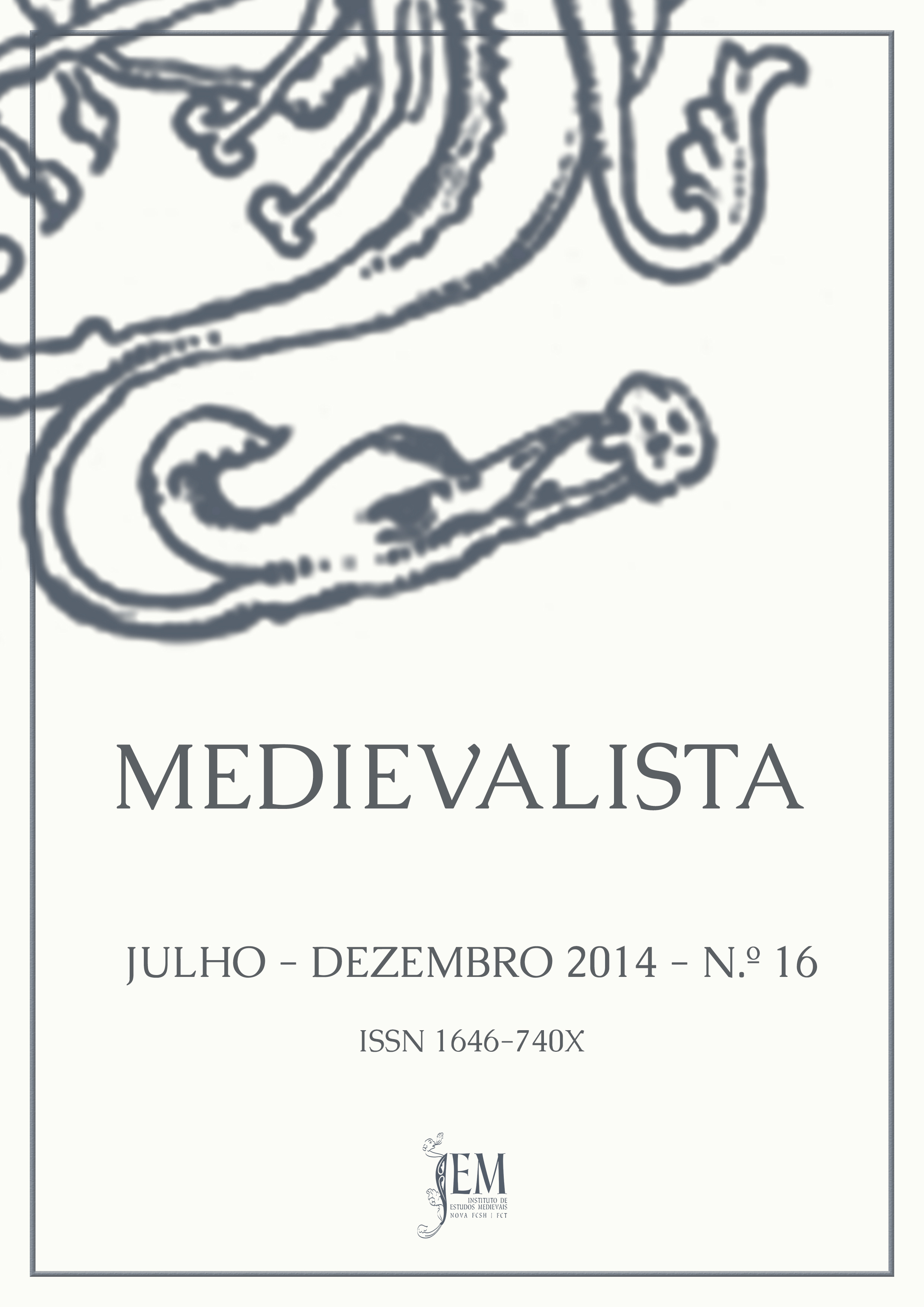
Medievalista
No. 16 (2014)Keeping with what has been the practice of Medievalista Online, the present issue maintains the principle of publishing research that is as varied as possible in terms of themes, genres, or regions. In this way, we follow, to a certain extent, the broad-mindedness of Jacques Le Goff, the great medievalist whose death we mark in this issue with an “In Memoriam” written by our Director.
-
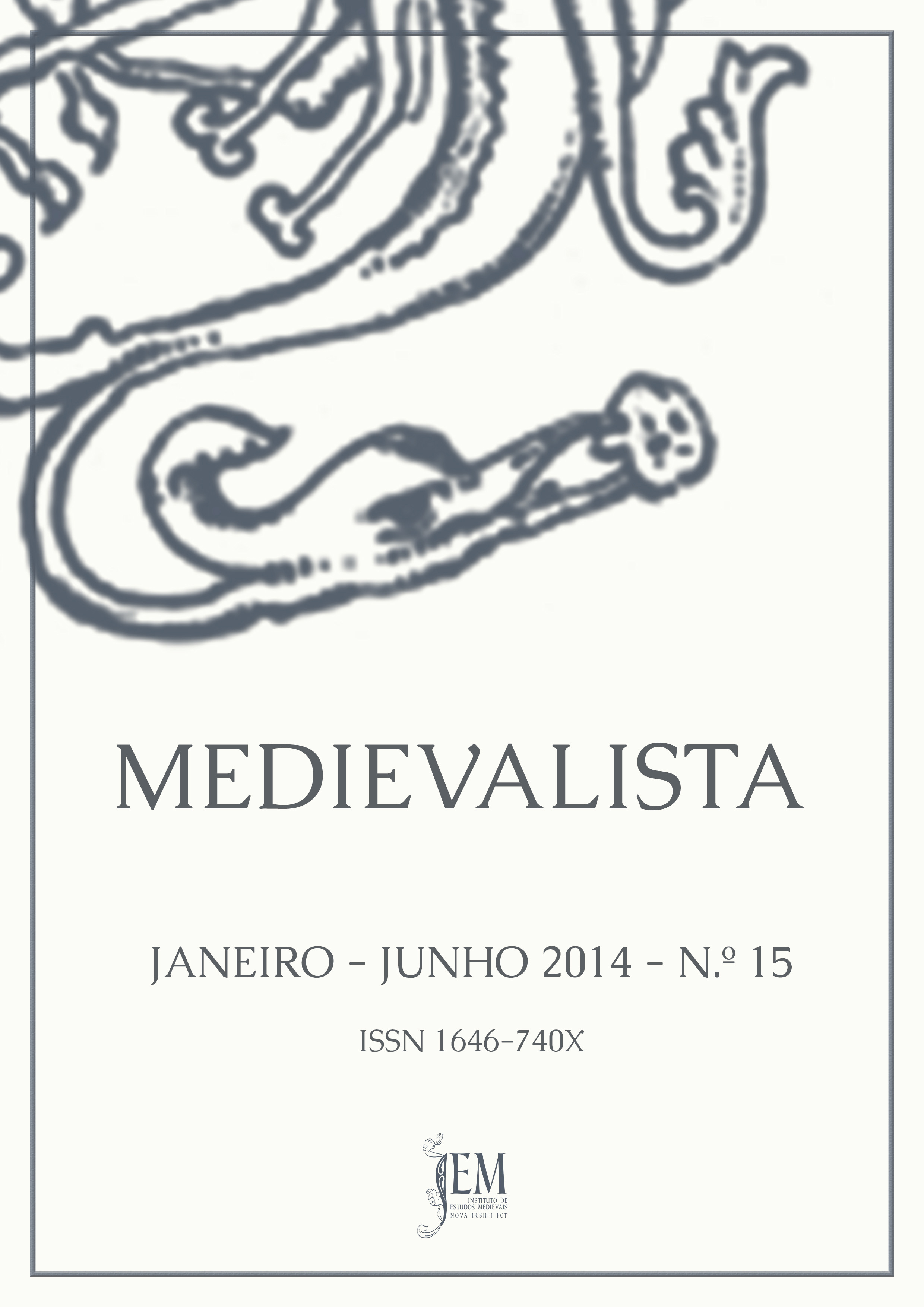
Medievalista
No. 15 (2014)The present issue of Medievalista starts a new phase in the life of the journal. After a long period of preparation, fulfilling scientific requirements, and solving technical and administrative demands with financial costs, our journal is now part of the LusOpen, DOAJ and SciELO platforms. It is a further small step in the path Medievalista has been walking, but we want it to be a big step in the diffusion and dissemination of Medieval Studies by a Portuguese scientific journal.
-
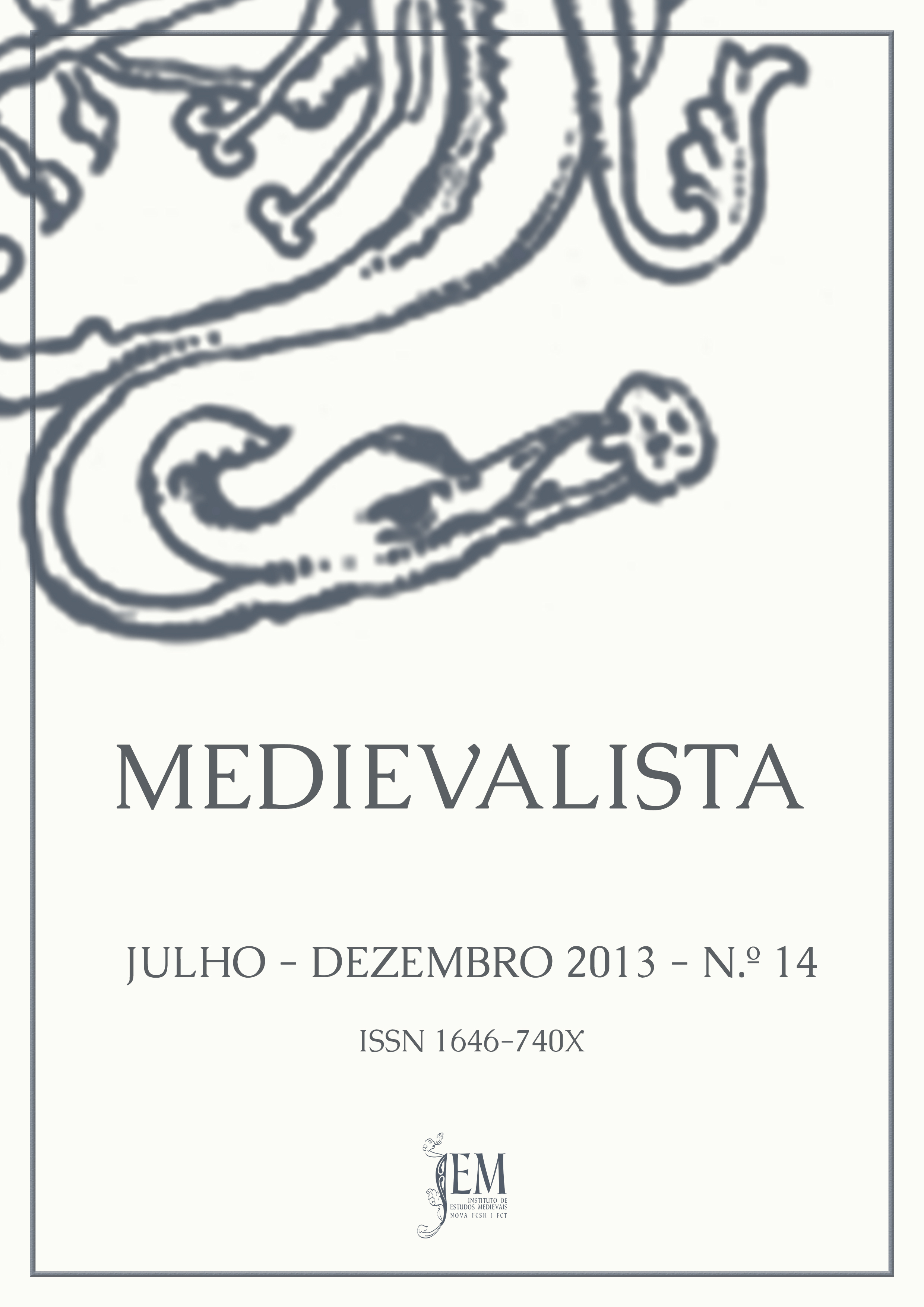
Medievalista
No. 14 (2013)The call for papers launched by Medievalista for its 14th and 15th issues found a great receptivity among scholars on the Middle Ages. In fact, we received a very significant number of papers to be submitted to peer review. Hence, although we are now publishing a wider number of articles than usual, a considerable number of proposals received by the Editorial Board have still been carried over to the next issue.
-
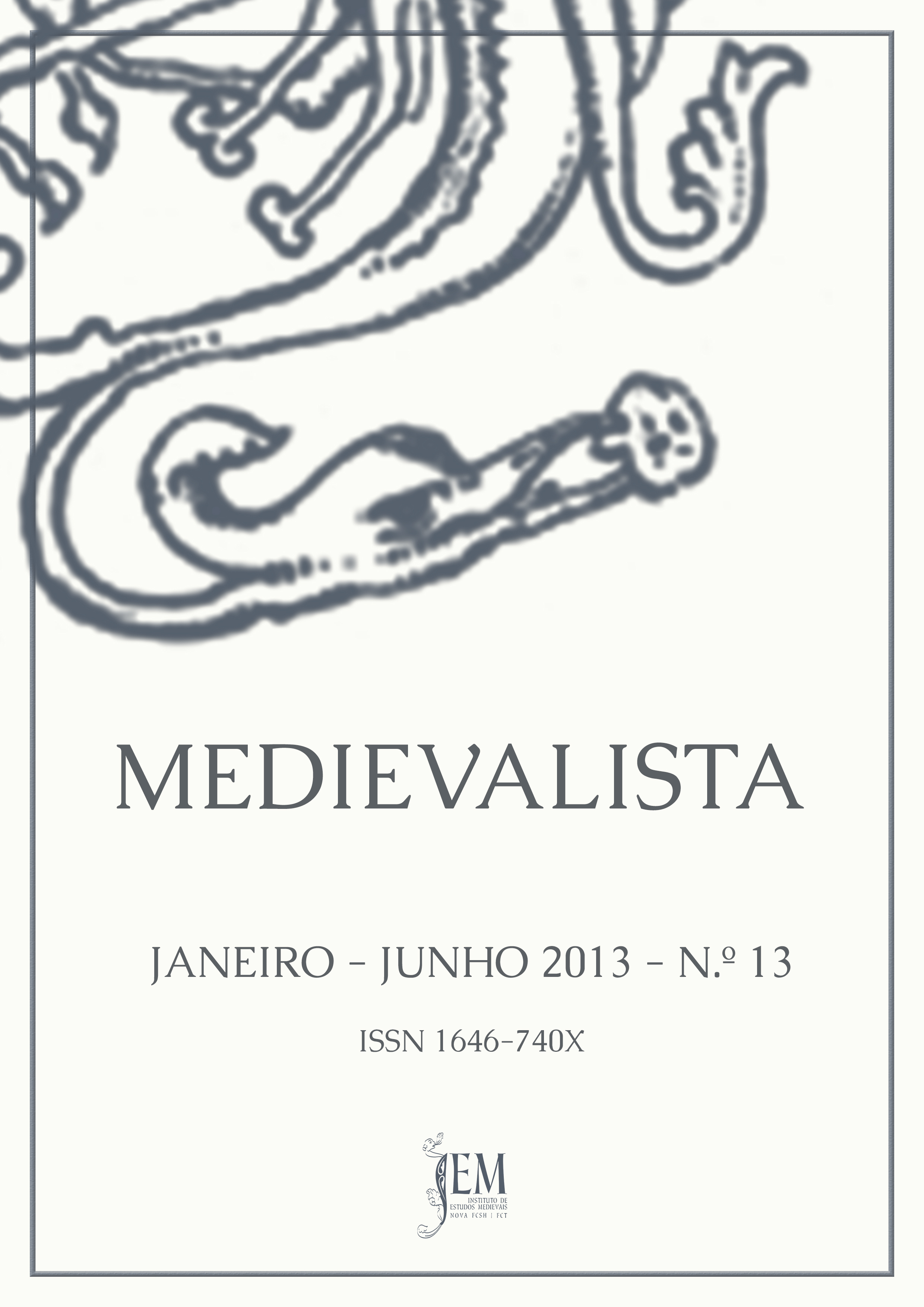
Medievalista
No. 13 (2013)In its eighth year of existence, Medievalista OnLine continues to guarantee regularity and a strict biannual periodicity in its edition. Despite the growing difficulties dictated by the well-known budget cuts in the funds of Research Centres - and to which the Institute of Medieval Studies is no exception - the preservation of the only Portuguese periodical scientific publication dedicated to Medieval Studies, open to the collaboration of national and foreigners, of established researchers or of those taking their first safe steps on the path of the research on the Middle Ages, is a priority of our Institute and a task for all those who have made Medieval Studies their field of work. This is the path we decided to take in 2005 and which we intend to keep following in the future.
